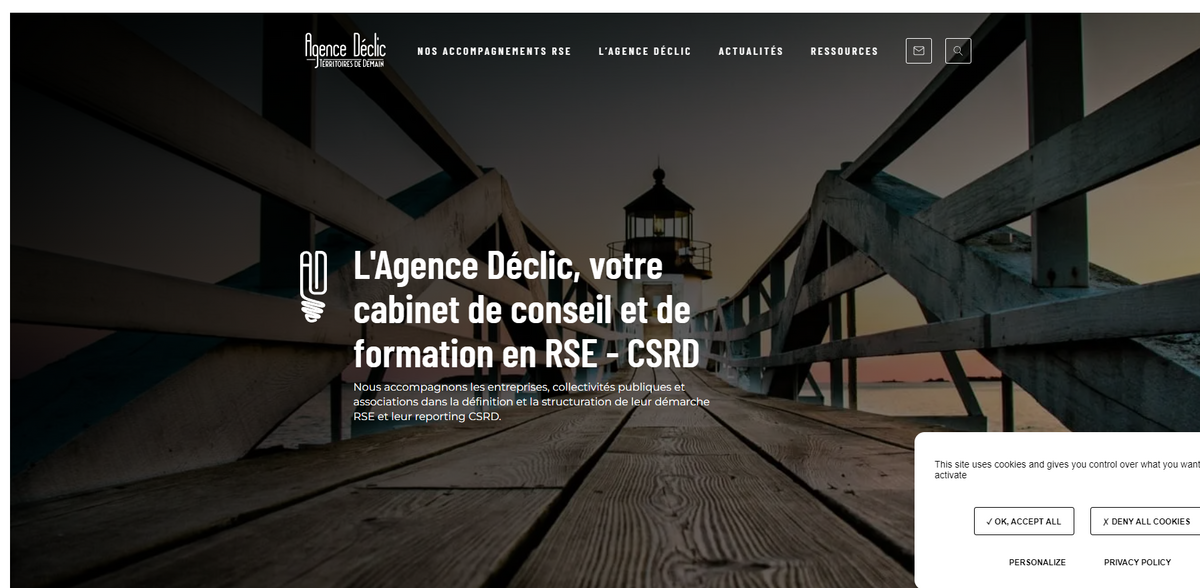What Is This Project All About?
CABINET DE CONSEIL EN STRATÉGIE RSE & CSRD – a consulting firm specializing in sustainability projects – supports organizations in their journey toward sustainable transformation, by offering expertise in the RSE approach, CSRD reporting, and carbon assessment. The Déclic Agency, for example, is well known for guiding organizations through a wide array of sustainability projects including strategic consulting in sustainable development, implementation of RSE approaches, GHG assessment services, dynamic training, and the orchestration of collective intelligence workshops to engage teams and take appropriate action. With a focus on deploying a comprehensive sustainable strategy, the project emphasizes that a mature RSE approach not only drives operational excellence but also positions companies as true mission-driven organizations in a constantly evolving landscape…
Main Benefits of an RSE Approach
Key impacts of embracing an RSE approach include:
- Precisely knowing the risks associated with the activity;
- Optimizing internal practices including governance, management, and the organization of work;
- Uniting teams around a defined purpose and a set of core values;
- Fostering dialogue with key stakeholders;
- Generating positive impacts on both the environment and local territories.
Customized Support for Every Step
The consulting expertise covers every phase of a company’s RSE approach. The process starts with a diagnosis of current RSE practices—often organizations are implementing sustainability practices without having noticed it! This stage aims to highlight existing good practices, identify and prioritize stakeholders, and refine strategic issues using a materiality matrix. After a thorough diagnosis, the next step is building the action plan. This involves defining concrete actions, designating actors, allotting resources, planning activities and setting monitoring indicators. The methodology is designed to be collaborative—engaging teams through seminars, training sessions, and practical tools—ensuring that every action is taken with collective insight and practical expertise.
Building a Low‑Carbon Strategy and Complying with the CSRD Directive
Staying ahead in today’s market means addressing environmental concerns head on. Organizations can build a low‑carbon strategy by calculating GHG emissions, defining trajectories, setting concrete objectives, and implementing a detailed action plan. In parallel, compliance with the CSRD directive is crucial. Through a focused process that includes double materiality, gap analysis, and the preparation of compliant reports, the project ensures organizations meet stringent regulatory requirements. These steps are vital for aligning with both local mandates and global best practices while navigating the complexities of the sustainable development arena…
Enhancing Corporate Purpose and Training for Public Markets
Apart from environmental performance, defining a corporate purpose plays a central role in achieving mission-driven status. The project guides organizations on how to become mission‐driven companies by clearly articulating statutory objectives and consolidating their purpose. Moreover, the initiative encompasses developing responsible purchasing strategies through precise mapping and policy deployment. Training also proves to be a cornerstone in the approach, particularly in the realm of RSE for public markets—sometimes featuring a certified Qualiopi organization. This comprehensive training empowers teams with the knowledge and skills necessary to propagate sustainability both internally and externally.
Long‑Term Impact on Organizational Excellence
Implementing an RSE approach is not a one-off task but a long‑term endeavor, one that is firmly embedded in the reality of a VUCA world—that is, a world that is Volatile, Uncertain, Complex, and Ambiguous. By continuously monitoring and animating the RSE approach, organizations can sustain momentum and ensure ongoing excellence in their internal practices. With regular evaluations and the implementation of new actions, the approach helps in structuring sustainable development efforts that create lasting benefits for the organization and its surrounding environment… It’s about setting up a framework that not only navigates current challenges but also anticipates future ones.
Project Impact: SDGs and Sustainability Goals
- Environmental: Minimizing ecological footprints through practical low‑carbon strategies.
- Social: Promoting better internal practices, team unity, and stakeholder dialogue.
- Economic: Optimizing internal practices and resource allocation for long‑term growth.
- Governance: Enhancing transparency through strategic consulting and robust reporting.
- Territory: Supporting local development and creating positive impacts on the community.
The Future of Responsible Business Strategies
In a world where sustainability and responsible corporate behavior are no longer optional but essential, the project stands as an exemplar of how organizations can transition into truly mission‑driven companies. By adopting a robust RSE approach, organizations are better equipped to understand the complexities of modern business, leading to decisions that balance local needs and global challenges. The integration of the 7 central questions from ISO 26000 and the 17 Sustainable Development Goals into a model based on five pillars – environmental, social, economic, governance, and territory – offers a clear roadmap for businesses. This model not only highlights key areas of improvement but also facilitates the continuous evolution of strategies necessary for thriving in an ever‑changing world… Whether the goal is to structure RSE strategy, build a low‑carbon pathway, comply with CSRD requirements, develop responsible purchasing, or simply engage teams in meaningful training sessions, the project provides a clear, actionable blueprint for success.


















